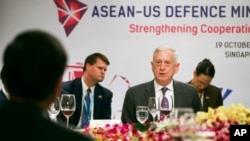The United States and South Korea have suspended another major military exercise in a continued push for diplomacy, the Pentagon said Friday.
Chief Pentagon spokesperson Dana White said the two militaries would suspend their joint air exercise, dubbed Vigilant Ace, in order to “give the diplomatic process every opportunity to continue.”
The decision was announced following trilateral talks among U.S. Defense Secretary Jim Mattis and his South Korean and Japanese counterparts. The defense ministers are in Singapore for an Association for Southeast Asian Nations (ASEAN) defense ministers’ meeting.
The suspension of the air exercise follows a number of U.S. military decisions in the past year aimed at persuading North Korea to negotiate a verifiable path to giving up its nuclear weapons.
Earlier exercises delayed, canceled
The United States and South Korea delayed their first large-scale exercise of the year, Foal Eagle, so it would not clash with the Winter Olympics.
Later they canceled Ulchi-Freedom Guardian, their second large-scale joint exercise that had been scheduled for August.
That cancellation came after an unprecedented June summit between U.S. President Donald Trump and North Korean leader Kim Jong Un in Singapore, where Trump announced the U.S. would stop what he called “provocative” and “expensive” “war games” with South Korea.
The U.S. military characterizes its joint exercises on the Korean Peninsula as “defensive” in nature rather than “provocative,” a term frequently used by China and North Korea to describe the drills.
James Schoff, with the Washington-based research group the Carnegie Endowment for International Peace, said on Twitter Friday that the latest suspension will make it “difficult to ramp back up” military exercises on the peninsula without provocations from North Korea.
He said the move would give Pyongyang an incentive to “stay calm,” but cautioned that the militaries could not suspend exercises indefinitely.
Training, skills are lost
Retired Lt. Gen. Tom Spoehr, a former deputy commander of U.S. forces in Iraq who now works at the conservative Heritage Foundation, criticized the air drill suspension Friday.
He said the U.S. should “not accede to North Korean demands to cancel them unless the north shows more tangible signs of seriousness in seeking peace and stability.”
Bruce Bennett, a senior defense analyst at RAND Corp., told VOA’s Korean service why the loss of training is important.
“So if we can’t do the air defense drills in Korea, could the U.S. do them back in the U.S.? Yes, we could,” he said. “But we wouldn’t have the terrain. We wouldn’t have our allies there. We wouldn’t have the air defense environment we would be operating in. So it’s a fairly significant loss in terms of the real environment that we would have to operate in a conflict.”
Vigilant Ace is an annual exercise that is usually held in December.
Is readiness eroded?
Many smaller-scale military exercises have continued on the peninsula and across the region, but the U.S. general nominated to be the next commander of American forces in South Korea pointed out during his confirmation hearing last month that the major military exercise suspension has caused “slight degradation” to military readiness on the peninsula.
When asked how many large-scale exercises could be skipped before a “significant decline in readiness,” Army Gen. Robert Abrams told Senate members it was “hard to judge.”
Inter-Korean Military Pact Leaves Washington Uneasy
A gap is growing between Washington and Seoul over an inter-Korean military pact that Washington worries might weaken South Korea's defenses against a North Korea attack.
Bruce Bechtol, a retired Marine and former intelligence officer, told VOA Korean that it’s too early to tell the effect of the cancellation on troop readiness.
“If you only cancel one or two exercises and then you get back to a regular training schedule, all can be well. But we need to understand a couple of things,” he said. “First of all, many of those troops that are over there are on a short tour so they’re only there for a year or two at the most.
“The other thing is you know troops rotate there for these exercises often is not out of the United States, so it gets them used to using the logistical system to help units that will have to go over there in case there’s a contingency or an actual conflict so all those kinds of things come into play when you’re talking about doing exercises.”
David Maxwell, a former special forces colonel who is now a senior fellow at the Foundation for Defense of Democracies, said the cancellation does impact readiness.
“However, the air forces, particularly the U.S. Military Air Force, Navy and Marine Corps can train in other locations and maintain their technical proficiency. So I expect that both the ROK Air Force and the U.S. military will continue to train and maintain technical proficiency. What is lost is the ability to conduct large-scale air operations, and the complex coordination that takes place in these kinds of exercises,” Maxwell told VOA’s Korean Service.
Christy Lee of VOA’s Korean Service contributed to this report.





